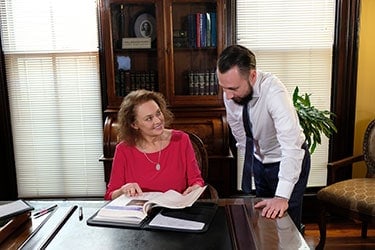 When opposing parties in a Kentucky Personal Injury case cannot resolve or “settle” their claim prior to litigation or trial, they may consider mediation to reach a resolution.
When opposing parties in a Kentucky Personal Injury case cannot resolve or “settle” their claim prior to litigation or trial, they may consider mediation to reach a resolution.
Mediation can be a wonderful tool to help resolve a claim without the expense, time and risk of litigation and a jury trial.
A neutral third party, who is also an experienced attorney, serves as the mediator to help the parties attempt to resolve the case.
Mediation is typically voluntary, however many Judges order mandatory mediation if the parties have not reached an agreement prior to trial.
About the Mediator and their Role
 Both parties have to agree on the mediator. Most mediators are experienced trial attorneys, who have litigated both plaintiffs and defense cases.
Both parties have to agree on the mediator. Most mediators are experienced trial attorneys, who have litigated both plaintiffs and defense cases.
This gives the mediator a unique insight in to how both sides approach their claim, as well as potentially outcomes should the case end up in front of a jury.
Both parties will provide the mediator with a detailed case summary, so that the mediator is familiar with your case before the day of the mediation. Mediators do not act as Judges, but instead try to help each party understand their claims strengths and weaknesses.
The mediator does not “choose a side” or “pick a winner” but instead works with you and the defense and suggest making compromises based on the facts of the case.
The mediator will look at very specific issues, unique to your case, to help you understand your case from both sides. A good mediator will ask questions throughout the process to prompt each side to re-evaluate their position.
It may be that the mediator will explain why the plaintiff should consider lowering their demand, while he also explains to the defendants why they need to raise their offer. Mediators will continually remind both sides of their risk should they proceed to trial.
What Does the Mediation Process Look Like?
The parties will meet at the agreed upon location and the agreed upon date and time. Most mediations can be expected to last all day, however some may resolve in a matter of hours.
Typically, the mediator will meet with all parties in the beginning to introduce himself and his role in the process. Your attorneys will attend with you, and the claims adjuster and defense attorney will attend for the insurance company.
After the introduction, the parties will have the option to give “opening statements.” This give both sides a chance to highlight the issues in their case.
Depending on the parties, they may choose to waive these opening statements so that the mediation doesn’t get off to a contentious start.
After the introduction or opening statements, the parties will be separated into their own rooms. From that point on, the mediator will meet with each party individually and go back-and-forth between the parties.
Most often, some form of negotiations has taken place between the parties prior to mediation. If negotiations have already begun in your case, prior to mediation, the party that has not responded to the last demand or counteroffer will make the first move.
For example, if you last demanded $200,000, and the defendants countered at $100,000, it will be your turn to make a counter-demand.
Once the parties are divided into separate rooms, the mediator uses this opportunity to gain information from both sides individually. This is a great opportunity for the mediator to learn more about you and your case, ask questions, and gain insight.
You can confidently tell anything to the mediator in confidence, that you do not want him to tell to the other side. If you want some information to remain confidential, the mediator will keep confidential.
While the mediator will talk to you and your lawyer together, they may also pull your lawyer aside to discuss something privately. The mediator will keep going back-and-forth between the parties to encourage each side to make moves towards settlement.
Helpful Tips Regarding Mediation
Be Prepared to Compromise
Mediation is all about compromise, from both sides. If you are unwilling to compromise, then the mediation will not be productive. Listen to the mediator, he is experienced and will help you understand where you may need to compromise on your case.
You may not get dollar-for-dollar what you feel your case is worth, but you may make the insurance company pay far more then they evaluated to pay you for your claim.
You may feel there is no amount of money that will make you whole, but remember that if a jury determines you should be compensated, they will put a dollar amount on your injury at the end of the trial, based on the presentation of the evidence.
Be prepared for low offers from the insurance companies, especially at first
The insurance company is likely to start very low. That is why most mediations last several hours if not all day. Mediation is a process, so try not to get upset by low numbers at first, as the insurance company knows those offers are insufficient to compensate you for your loss.
Listen to Your Attorneys and the Mediator
During the mediation process, it is important to listen to your attorneys and the mediator. While it can be difficult to separate your emotions from your case, try to put emotions aside and listen to the rationale behind what weaknesses your case may have.
Every case is different, and no case is perfect. Experienced attorneys and mediators have handled hundreds, if not thousands of claims, and are experienced trial lawyers.
They have a good sense for what a jury may or may not do, and are in the position to understand risk better than most.
Understand there is a difference between Gross Amounts and Net Amounts:
The numbers you will be discussing at settlement with the mediator will be “Gross amounts.” That means the number before all fees, cost, and liens are taken out of the settlement funds.
“Net amounts” are what you will actually recover from your settlement, after all fees and cost. Your attorney should have an estimated net amount to review with you before you decide to settle your case.
What Happens if I Settle My Case at Mediation?
If you settle your case at mediation, all the parties will sign a written agreement with the terms of the settlement agreement.
This will include the amount agreed upon for settlement, and other issues that the parties agree upon like when the defendants will have a written release to plaintiffs, and when the defendants will issue the settlement checks after the release is signed.
Once the settlement release is signed and you have your settlement check, your attorney must finalize all cost and liens before distributing your settlement funds to you.
What Happens If I don’t Settle My Case at Mediation?
If you don’t settle your case at mediation, the parties may continue to negotiate afterwards, or the parties will continue to litigate, working towards trial. It is not uncommon for cases to have more than one mediation.
Sometimes, more evidence is brought to light after the first mediation, which requires another round. Mediation is valuable even if you don’t settle, because you learn more about the strengths and weaknesses of the case.
If you do not settle your case at mediation, you will have to prepare to go to trial. Sometimes cases can be settled at trial before the jury reaches a verdict, but otherwise you will have to leave in the hands of the jury.
What are The Benefits of Mediating Instead of Proceeding to Trial?
 You face many risk and uncertainties with a jury trial. One, you don’t know who will be on your jury. A favorable verdict of any amount is not guaranteed.
You face many risk and uncertainties with a jury trial. One, you don’t know who will be on your jury. A favorable verdict of any amount is not guaranteed.
Jury trials are also far more expensive, as attorneys must pay experts and doctors for their time, and will spend much more money to litigate your case, which ultimately comes out of your settlement.
You have to weigh the cost, time and money it takes to go through a jury trial. Mediation gives you control over your final settlement amount, and ensures that you receive your settlement funds sooner than a jury award.
Remember, even if you receive a jury award, the defendants may appeal that decision, which could take another year or two to resolve.
Mediation gives you an opportunity for you to maximize the value of your case, and to get the insurance companies best offer to settle, before trial.
Sometimes it is best NOT to settle at mediation. Just listen to your attorneys and the mediator. Ultimately the choice to settle or not settle is in your hands.
Our experienced Kentucky Personal Injury Attorneys mediate cases regularly, and have received millions of dollars for our clients.
If you need a Kentucky personal injury attorney to represent you and your interest, call us today at (888) 782-9090 so we may evaluate your case for free.
We have offices in Bowling Green, Glasgow, Greenville, Kentucky, but we travel throughout Kentucky & Tennessee to meet with our injured clients.

